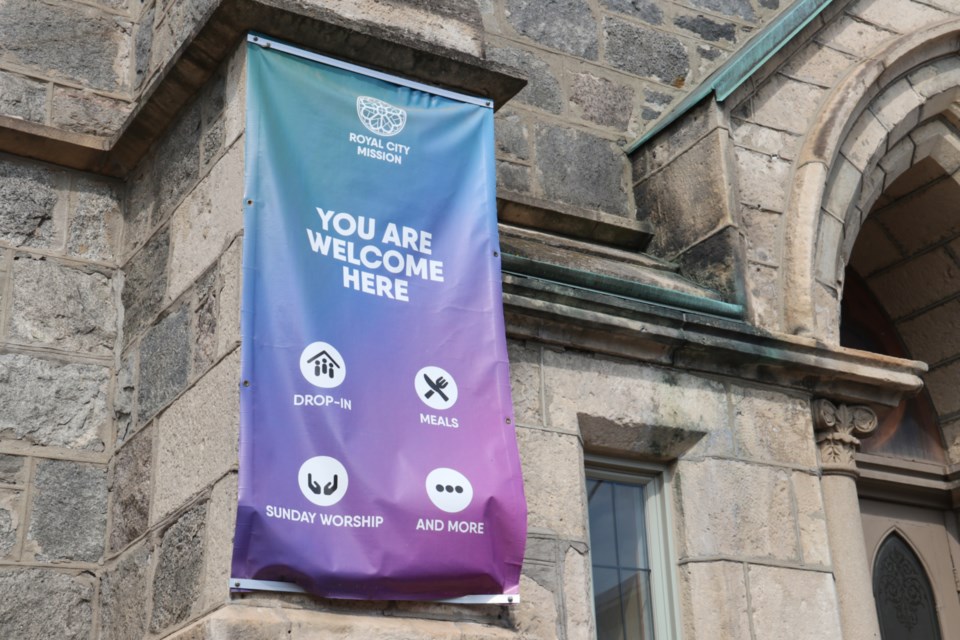City council has agreed to extend drop-in hours at Royal City Mission (RCM) for an extra three months, taking a pilot program through the winter, but rejected a request for funding to cover 12 hours per day throughout next year.
The decision came Tuesday evening, after council met behind closed doors for about 45 minutes to discuss contractual agreements – there’s one in place because of the pilot program.
“It’s better than nothing,” said RCM managing director Mark Anderson after the council vote. “It won’t allow us to maintain 12 hours (of drop-in per day) but we’ll still be able to extend more than what we were able to do without it.”
Without guaranteed funding, Anderson told council RCM would likely be able to provide four hours of drop-in service per day, funded by community donations. City funding will be used to increase those hours through the end of March.
As it stands, RCM provides 12 hours of daytime drop-in service per day, with four of those hours funded through the city’s pilot program approved last December.
Anderson noted RCM has used up its reserves in order to provide that level of service in the face of growing community needs and generally increased costs.
“If it weren’t for RCM, I would be even more desparing than I am right now, because I know that at least I know I can go to RCM and have somewhere to stay warm and not end up on the street,” Morgan Dandie told council, noting she’s waiting for an eviction letter because she receives social assistance due to disabilities and can no longer afford her rent.
“If we are not able to find our way clear to staff appropriately so people can have a place to be in community together, what does that say about our city?”
City staff recommended against providing any funding beyond the current pilot program, which raps up at the end of this year as the drop-in service is outside the city’s core mandate of services.
The new funding – $21,322 for each of January, February and March – will allow the extension of daytime drop-in services to continue through the winter.
That funding level essentially matches what’s been provided throughout the pilot program, which had a goal of increasing drop-in service by four hours per day.
“This is a stop-gap measure, temporary for this winter,” commented Coun. Rodrigo Goller, who noted the city didn’t provide any funding for drop-in services prior to the pandemic. “Our hope is that we would have a better plan for next year.”
The issue of daytime drop-in service is expected to be among the topics discussed during a housing symposium hosted early next year by the County of Wellington.
Pastor Kevin Coghill noted that so far this year, RCM has seen 48,169 visits from 8,067 unique individuals, with a daily average of 203 people, and served more than 75,000 meals.
He’s aware of 11 deaths this year of RCM regulars, two of which he considers to have died as a result of natural causes. He attributes the other nine to “poverty.”
Last December, council agreed to provide funding for four hours of drop-in service as part of a one-year pilot program, giving $250,850 to RCM from the tax rate operating contingency reserve.
That funding level, explained RCM’s managing director Anderson, was based on 2021 costs and service levels. Since then, costs have gone up and needs in the community have increased.
In order to provide 12 hours of drop-in service throughout 2024, RCM asked for $852,000, or $71,000 per month.
Without guaranteed funding, Anderson said RCM would likely be able to provide four hours of service per day, based on donation levels.
“The city of Guelph is left to deal with the consequences of decisions made by other levels of government.
“There’s no doubt in my mind that our drop-in space is needed for those that are unhoused and for those who are underhoused,” he added. “In the absence of another option, I can tell you that RCM will fill the gap to allow council to carefully consider more sustainable tactics.”
